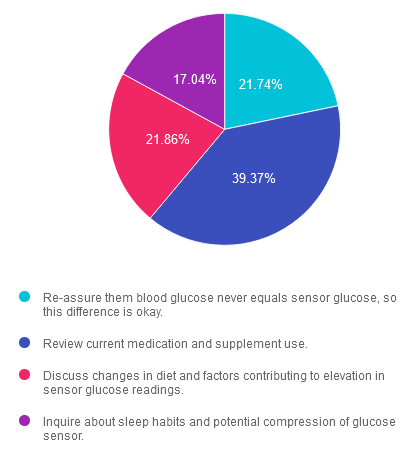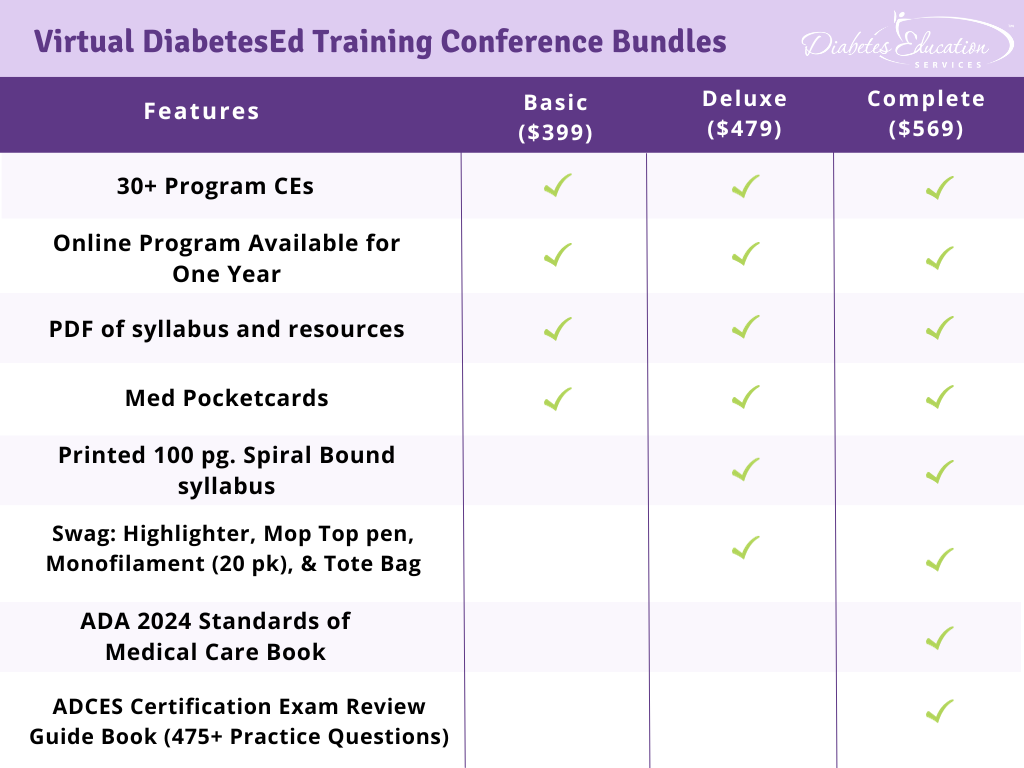For last week’s practice question, we quizzed participants on why CGM readings are higher than BG readings. 39% of respondents chose the best answer. We want to clarify and share this important information, so you can pass it on to people living with diabetes and your colleagues, plus prepare for exam success!
Before we start though, if you don’t want any spoilers and haven’t tried the question yet, you can answer it below: Answer Question

Question: KS has type 1 diabetes, takes degludec and lispro for their diabetes medications and was recently prescribed CGM therapy to support glucose monitoring. At their visit they report sensor readings have been consistently higher than blood glucose readings.
What would be an important follow-up question to evaluate the potential cause of this difference?
Answer Choices:
- Re-assure them blood glucose never equals sensor glucose, so this difference is okay.
- Review current medication and supplement use.
- Discuss changes in diet and factors contributing to elevation in sensor glucose readings.
- Inquire about sleep habits and potential compression of glucose sensor

Getting to the Best Answer
Answer 1 is incorrect. 21.74% chose this answer. “Re-assure them blood glucose never equals sensor glucose, so this difference is okay.” This answer is incorrect. Although it is true that sensor glucose does not equal blood glucose, there may be other factors contributing to consistent elevation in glucose trends. We would want to probe into other potential considerations before jumping to the conclusion that it is only the difference in measurement.
Answer 2 is correct. 39.37% of you chose this answer. “Review current medication and supplement use.” This answer is correct. Interfering substances such as acetaminophen and ascorbic acid (vitamin C) can contribute to higher glucose readings than actual glucose. The interfering substance depends upon the CGM manufacturer. The 2024 ADA Standards of Care reports the importance of reviewing medications and supplements used by persons with diabetes to identify possible interfering substances. They also recommend blood glucose monitoring if there is a concern of inaccurate data. Visit Section 7 of the 2024 Standards of Care to review the table of CGM manufacturers and potential interring substances.
Answer 3 is incorrect. About 21.86% of respondents chose this. “Discuss changes in diet and factors contributing to elevation in sensor glucose readings.” This answer is incorrect. Although sensor glucose and blood glucose values are more likely to significantly differ after a meal, KS reports consistent elevation in sensor glucose values. Diet factors contributing to elevated sensor glucose readings would likely contribute to elevated blood glucose readings too; we may just see a delay. Diet factors alone would not explain the consistent difference in elevation.
Finally, Answer 4 is incorrect. 17.04% chose this answer. “Inquire about sleep habits and potential compression of glucose sensor.” This answer is incorrect. Compression of the sensor during sleep can contribute to false sensor glucose readings, but we most often see sudden decreases (low) in glucose values. This is suspected to be due to local changes in blood flow/concentration of the interstitial glucose caused by direct pressure on the sensor. Screening for compression lows is important when reviewing CGM data but does not provide the best answer for consistently elevated glucose trends.
We hope you appreciate this week’s rationale! Thank you so much for taking the time to answer our Question of the Week and participate in this fun learning activity!
Want to learn more about this question?
Virtual DiabetesEd Training Conference – Join us Live on April 17th – 19th 2024 at 11:30 AM PST

Join Coach Beverly and Team for two and a half days of knowledge-sharing, fun, and “aha” moments for our Virtual DiabetesEd Training Conference April 17th – 19th, 2024.
Attendees will leave this conference with new tools and a refreshed understanding of the latest advances in person-centered diabetes care. Our team highlights the ADA Standards of Care, medications, behavior change, technology, medical nutrition therapy, and more!
Our instructors co-teach the content to keep things fresh and lively.
Friend Discount: 3 or more only $449 per person. Email us at [email protected] with the name and email of each registrant to get the discount!
Program Details
- Dates: April 17-19th, 2024
- Registration Fee: $399-$569 (see more about reg. options below)
- Friend Discount: For 3 or more people, each person saves $50 off their registration. Email us at [email protected] with the name and email of each registrant to get the discount!
- CEs: 30+ CEs | 18 units for Virtual Conference plus 10+ Bonus CEs. CEs can be applied toward CDCES’s initial application or renewal.
- Speakers: View Conference Faculty
Registration Options

Sign up for Diabetes Blog Bytes – we post weekly Blog Bytes that are informative and FREE! Every week we post one exam practice Question of the Week and Rationale of the Week. Sign up below!
Accreditation: Diabetes Education Services is an approved provider by the California Board of Registered Nursing, Provider 12640, and our CPEU courses have received Prior Approval* from the Commission of Dietetic Registration (CDR), Provider DI002. Since our CPEU courses received Prior approval* from the CDR, these CPEU courses satisfy the CE requirements for the CDCES /BC-ADM regardless of your profession!
The use of DES products does not guarantee the successful passage of the certification exam. CBDCE and ADCES do not endorse any preparatory or review materials for the CDCES or BC-ADM exams, except for those published by CBDCE & ADCES.









